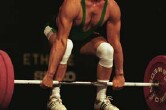
TUESDAY, April 27 (HealthDay News) — Long-term use of anabolic steroids weakens the heart more than had been thought, a new study of weight lifters shows.
The study provides what might be the first clear evidence that these muscle-building drugs, used widely by bodybuilders and athletes, can damage heart function, said Dr. Aaron L. Baggish, an assistant in medicine at Massachusetts General Hospital, and lead author of a report on the study published online April 27 in Circulation: Heart Failure.
“There have been mixed assumptions but very little direct scientific study of what happens to the heart when it is exposed to an anabolic steroid, and none of what happens with chronic use,” Baggish said.
Anabolic steroids, which mimic the muscle-building effects of the male hormone testosterone, have been used by athletes in various sports. Among professional baseball players, Mark McGwire recently acknowledged using them off and on for nearly a decade, including 1998, when he hit 73 home runs to set a new major league single-season record. New York Yankees third baseman Alex Rodriguez has acknowledged using the drugs, and allegations have linked other big-name players, including Barry Bonds and Roger Clemens, with their use.
For the study, Baggish and his colleagues at Harvard Medical School and McLean Hospital enlisted 19 male weight lifters, including 12 who reported taking, on average, about 675 milligrams of steroids a week for nine years and seven who said they never used steroids. The researchers used Doppler echocardiography, which uses ultrasound to generate moving pictures of the heart’s size and function, to study the function of the each weight lifter’s left ventricle, which is the blood-pumping chamber.
“The common myth is that steroids make the heart grow massively large,” Baggish said. “We didn’t see that.”
What they did see was that the hearts of the steroid users did not contract as vigorously and relax as efficiently as those of the nonusers.
The ejection fraction of the steroids users — which is the volume of blood expelled with each beat — was below normal in 10 of the users but only one of the nonusers. A healthy left ventricle has an ejection fraction of 55 to 70 percent but only two steroid users met that standard, the study found. Also, the measure of relaxation efficiency, which reflects the rate at which blood refills the left ventricle, was reduced by almost half in the steroid users.
“The number of persons in the study was small, and this needs to be studied in larger trials, but the data from this pilot study suggest that steroid use predisposes people to heart failure,” Baggish said.
Heart failure, progressive loss of the ability to pump blood, is a leading cause of cardiac deaths.
However, it’s not clear from the study how long steroids must be used to cause such heart damage, Baggish said. “Several small studies of shorter duration find damage only with heart relaxation, not contraction,” he said. “As use continues, toxicity develops.”
And he noted that there have been, “numerous case reports of horrific vascular events from short-term use.”
Baggish said he hopes to repeat the study with a larger group of participants to confirm the findings. Meanwhile, he said, “when you add up all of the organ systems that steroids do damage to, and the heart is just one important organ, the logical recommendation is that steroid use is a no-no, for cosmetic or athletic purposes.”
More information
The U.S. National Institute on Drug Abuse has more on the dangers of steroids.

